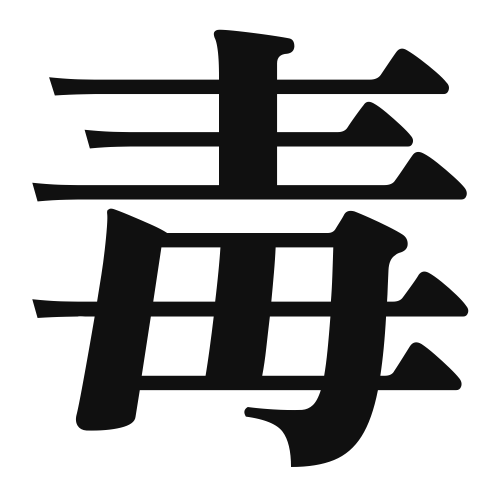1. Overview of Meaning
The kanji “毒” (doku) means “poison” or “toxin.” It refers to substances that can cause harm or illness when ingested, inhaled, or absorbed by living organisms.
2. Formation and Radical
Formation of the Kanji: The kanji “毒” is a phonetic-ideographic character (形声文字). It combines the radical for “insect” (虫) on the left, which suggests something harmful, with the phonetic component “毒” (doku) on the right, which indicates its pronunciation.
Radical: The radical of “毒” is 虫 (mushi), which means “insect” or “bug.” This radical often appears in kanji related to harmful creatures or substances.
3. Examples of Usage
Common Words and Phrases:
- 毒薬 (どくやく, dokuyaku) – poison
- 毒素 (どくそ, dokuso) – toxin
- 毒舌 (どくぜつ, dokuzetsu) – sharp-tongued (often used to describe someone who speaks harshly)
Example Sentences in Daily Conversation:
- この植物には毒があります。 (このしょくぶつにはどくがあります。) – This plant is poisonous.
- 彼は毒舌で有名です。 (かれはどくぜつでゆうめいです。) – He is famous for his sharp tongue.
4. Synonyms and Antonyms
Similar Kanji:
- 害 (がい, gai) – harm; this kanji refers to damage or injury, but does not specifically imply poison.
- 有毒 (ゆうどく, yūdoku) – toxic; this term specifically indicates that something is poisonous.
Antonyms:
- 無害 (むがい, mugai) – harmless; this kanji indicates that something does not cause harm.
- 安全 (あんぜん, anzen) – safe; this term refers to the absence of danger or risk.
5. Cultural and Historical Background
Relation to Japanese Culture: In Japanese culture, the concept of poison is often associated with caution and danger. It appears in various traditional stories and folklore, where poisonous plants or creatures play significant roles.
Proverbs and Idioms:
- 毒を持って毒を制す (どくをもってどくをせいす, doku o motte doku o seisu) – “Control poison with poison.” This proverb suggests that sometimes, one must use a similar force to counteract a problem.
